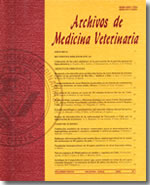Use of chitosan and polypropylene for the surgical correction of penile deviation in bulls: clinical and histological aspects
Main Article Content
Abstract
Problems in the reproductive tract may result in difficulty or inability to copulate. Premature penile deviation is an important cause of impotency in male bovines. The aim of the study was to perform clinical and histological evaluation of the correction of surgically induced penile deviation in bulls by fixing the penile apical ligament in the tunica albuginea using synthetic or biological implants. Twenty-one animals with normal penile conformation were subjected to surgical induction of penile deviation by excision of a fragment from the penile apical ligament and replacement with a chitosan slab or polypropylene mesh. The scarification of the tunica albuginea was assessed as a control. The results showed that the tested or evaluated surgical techniques were ineffective in penile deviation correction, since all the animals failed to reestablish the normal axis of the penis. However, microscopic exam revealed that the chitosan slabs proved to be less irritating to the receptor tissue. Therefore, the proposed surgical techniques using synthetic or biological implants were ineffective for the correction of induced penile deviation in bulls.

